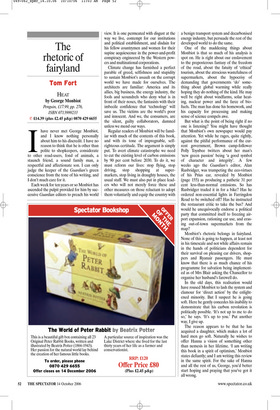The rhetoric of fairyland
Tom Fort
HEAT by George Monbiot Penguin, £17.99, pp. 276, ISBN 0713999233 ✆ £14.39 (plus £2.45 p&p) 0870 429 6655 Ihave never met George Monbiot, and I know nothing personally about him to his discredit. I have no reason to think that he is other than polite to shopkeepers, considerate to other road-users, fond of animals, a staunch friend, a sound family man, a respectful and affectionate son. I can only judge the keeper of the Guardian’s green conscience from the tone of his writing, and I don’t much care for it.
Each week for ten years or so Monbiot has ascended the pulpit provided for him by successive Guardian editors to preach his world view. It is one permeated with disgust at the way we live, contempt for our institutions and political establishment, and disdain for his fellow countrymen and women for their supine acquiescence in the power-and-profit conspiracy engineered by the Western powers and multinational corporations.
Climate change has furnished a perfect parable of greed, selfishness and stupidity to sustain Monbiot’s assault on the corrupt world we have made for ourselves. The architects are familiar: America and its allies, big business, the energy industry, the fools and scoundrels who deny what is in front of their noses, the fantasists with their imbecile confidence that ‘technology’ will save us. The victims are the world’s poor and innocent. And we, the consumers, are the silent, guilty collaborators, damned unless we mend our ways.
Regular readers of Monbiot will be familiar with much of the contents of this book, and with its tone of impregnable, selfrighteous certitude. The argument is simply put. To avert climate catastrophe we need to cut the existing level of carbon emissions by 90 per cent before 2030. To do it, we must reform our lives: stop flying, stop driving, stop shopping at supermarkets, stop living in draughty houses, the usual stuff. We must also put in place leaders who will not merely force these and other measures on those reluctant to adopt them voluntarily and equip the country with a benign transport system and decarbonised energy industry, but persuade the rest of the developed world to do the same.
One of the maddening things about Monbiot is that so much of his analysis is spot on. He is right about our enslavement to the preposterous fantasy of the freedom of the road, about the fatuity of ‘ethical’ tourism, about the atrocious wastefulness of supermarkets, about the hypocrisy of demanding that governments ‘do’ something about global warming while really hoping they do nothing of the kind. He may well be right about windfarms, solar heating, nuclear power and the farce of biofuels. The man has done his homework, and his capacity for processing and making sense of science compels awe.
But what is the point of being right if no one is listening? You might have thought that Monbiot’s own newspaper would pay attention. Yet while he rages, quite rightly, against the pitiful performance of the current government, Brown camp-follower Polly Toynbee twitters about her man’s ‘new green passion’ being ‘a good symbol of character and integrity’. A few weeks ago the Guardian’s editor, Alan Rusbridger, was trumpeting the eco-virtues of his Prius car, revealed by Monbiot (page 155) as producing a pathetic 31 per cent less-than-normal emissions. So has Rusbridger traded it in for a bike? Has he ordered non-essential lights in Farringdon Road to be switched off? Has he instructed the restaurant critic to take the bus? And would he unequivocally endorse a political party that committed itself to freezing airport expansion, rationing car use, and erasing out-of-town supermarkets from the map?
Monbiot’s rhetoric belongs in fairyland. None of this is going to happen, at least not in his timescale and not while affairs remain in the hands of politicians dependent for their survival on pleasing car drivers, shoppers and Ryanair passengers. He must know that there is as much chance of his programme for salvation being implemented as of Mrs Blair asking the Chancellor to organise her husband’s farewell do.
In the old days, this realisation would have roused Monbiot to lash the system and clamour for ‘direct action’ by the enlightened minority. But I suspect he is going soft. Here he gently concedes his inability to demonstrate that his carbon revolution is politically possible. ‘It’s not up to me to do so,’ he says. ‘It’s up to you.’ Put another way, I give up.
The reason appears to be that he has acquired a daughter, which makes a lot of hard men go soft. Naturally he wishes to offer Hanna a vision of something other than nemesis in her lifetime. ‘I am writing this book in a spirit of optimism,’ Monbiot states defiantly; and I am writing this review in the same spirit. For the sake of Hanna and all the rest of us, George, you’d better start hoping and praying that you’ve got it all wrong.


































































































 Previous page
Previous page